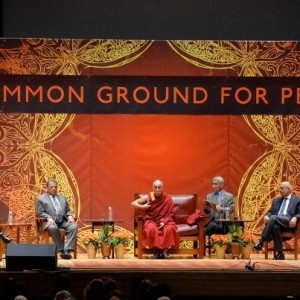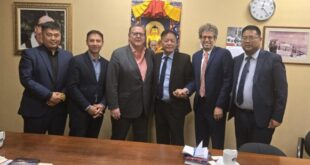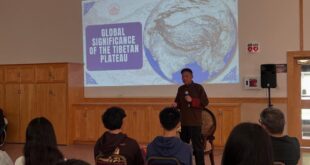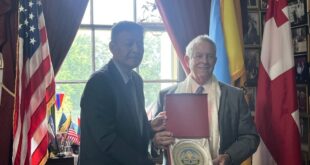Syracuse, NY 8th October 2012
After a very long flight from New Delhi, His Holiness the Dalai Lama arrived yesterday in Syracuse, New York, where he was met at the airport by Syracuse University Chancellor, Nancy Cantor, Vice President Tom Walsh and Oren Lyons, Native American Faithkeeper of Onondaga Nation. A short drive through maple forest in an array of autumn colours brought him to the residence of Samuel and Carol Nappi, who were there to greet him. Mr Nappi, founder and director of World Harmony Productions, is the inspiration for the Common Ground for Peace forum that His Holiness is participating in during his stay.
This morning, the weather was crisp and bright as His Holiness met his fellow panellists backstage at the Goldstein Auditorium of Syracuse University. The audience who had come to listen to them were first regaled with the haunting strains of the musical group Voices of Afghanistan. Dean’s Professor of Humanities, Gregg Lambert opened the proceedings. NBC anchor at large, Ann Curry, introduced the panellists and SU Chancellor Nancy Cantor introduced His Holiness.
Ann Curry began by asking, in the context of the changes that have recently taken place across North Africa and the Middle East, what simply is the ground for peace. His Holiness replied,

“If you watch children playing together, they don’t ask each other about their background, race or beliefs they simply recognise others like themselves, smile and play together. I believe that as human beings all 7 billion of us are the same. The way we are born and the way we die is the same; the way we eat, sleep and dream is the same. As human beings we are the same, and this something we need to think more about.”
Shirin Abadi, Iranian Nobel Peace Laureate, said the cause of peace is social justice and democracy. She pointed out that recent changes in the Arab world may have got rid of dictators, but that alone is not democracy. Mohamed ElBaradei, also a Nobel Peace Laureate, said that wherever we come from we all seek dignity, fairness and justice. Where there hasn’t been democracy before, we have to build it. He felt that the Middle East is at that threshold. Former UN Ambassador Andrew Young suggested that asserting the simple right to live as a human being was a ground for peace, but that when this also involves regime change violence often occurs. The wish for regime change needs to be parallelled by a non-violent approach. Former CIA director R. James Woolsey likened revolution to a three act play. In act one the dictator is kicked out and in act two the rule of the people by the people is established. However, too often this is followed by an act three in which the ruthless step in and take over. He recommended that in the Middle East, act three can be prevented if the world weans itself off the use of oil. Lastly, Irshad Manji, founder of the Moral Courage Project at NY University, said that asking questions is a basic human right. Democracy isn’t just about who rules the country, but also about being able to ask who you can fall in love with, what music makes you dance. When the right to question is acknowledged, democracy is on the rise.
Ann Curry asked His Holiness to comment on the observation that young people feel their future is in jeopardy because of anger and violence. He recalled the wars he had seen since he was born in 1935, but noted that now many people question why they should go to war. Similarly, when he was young, no one spoke about caring for the environment; now everyone is aware of it. Interest in non-violence is increasing, while science and religion that in the past were at loggerheads now find useful things they can learn from each other. These are all grounds for hope. On a personal level, he said,
“If we don’t respect others, we develop mistrust, suspicion and fear which ultimately lead to conflict. We need to see that others’ suffering is our suffering too. In the past we may, like Tibet and at times the US, have been able to exist in isolation, but in the world today, we have to be concerned about everyone else.”
His Holiness said that the twentieth century to which he belongs is gone, but there are more than 80 years of the twenty-first century yet to come. The past cannot be changed, but the future can be shaped here and now. He declared that we need to take a more holistic approach, to ask more questions and to take reality into account. And to that we need to add determination, whose source is warm-heartedness. Don’t act, he cautioned, because the Dalai Lama says so, but investigate things for yourselves, examine things for yourselves.
“Peace is not the mere absence of violence; peace must come from inner peace. And inner peace comes from taking others’ interests into account.”
The morning session was concluded with a song from TEAL-ONE97, a group of musicians of Middle Eastern and North African descent. During the lunch break His Holiness gave an interview to Ann Curry in the course of which she asked several questions about the situation in Tibet. She asked if he hoped that the impending new leadership in China would be more open, and he agreed that some say they will be.
“However, the Chinese system is hard to change and right now I don’t want to speculate. Let’s wait 6 months to a year or two and we’ll see.”
Asked if there was one thing that would help in Tibet, His Holiness replied, “Freedom.” He went on to say that in the twenty-first century we need to solve problems through dialogue, both sides respecting each others’ point of view, not one side giving in to the other. The victory of one side and the defeat of the other is not a solution.
The afternoon session of the Common Ground for Peace forum focussed on Global Consciousness. His Holiness made the point that human beings have intelligence and the ability to adapt to different circumstances. He cited the example that after 3-4000 years of placing faith in prayers, in recent times science has given us a new view of reality. Now people place their hopes in science and technology. However, he remarked that if we have mental peace we can cope with physical pain, whereas physical comfort cannot subdue mental unease. It has become clear that genuine peace depends on inner peace. He said we are at a crossroads where we can change our approach to seeking happiness. We need to educate people to understand that material development alone does not yield inner peace. While it is important to see how we can make life better for all, we cannot take our present way of life for granted.
Martin Luther King III elaborated on this, quoting his father as saying that it’s an insult to expect people to lift themselves up by their own bootstraps if they have no boots. Mohammed ElBaradei added that poverty is a weapon of mass destruction that we need to eliminate. Shirin Abadi asked how we can expect our children to think of peace when popular video games focus on war and killing and the most popular toys are replicas of weapons. She said inner peace is something we have to learn about. Roxana Saberi spoke about asking her cell-mates, when she was imprisoned in Iran, whether they didn’t hate their captors and was impressed that they said, “No, we forgive them.” The value of new communications technology was the opportunity it gave for people to show support. Imprisoned activists fear being forgotten, she said, and knowing they are not alone gives them great strength. A.R. Rahman, the Indian composer and musician, quoted Mahatma Gandhi, “Be the change you wish to see.”
At the end of the discussions, audience and panellists alike were moved by Israeli singer Liel Kolet and the Voices of Peace Choir, which consists of Jewish, Muslim and Christian children, singing about the children of today’s dream of tomorrow. As he took his leave, His Holiness made everyone laugh when he said,
“I enjoyed these discussions and I was particularly pleased to see that the faces in the audience remained alert.”




